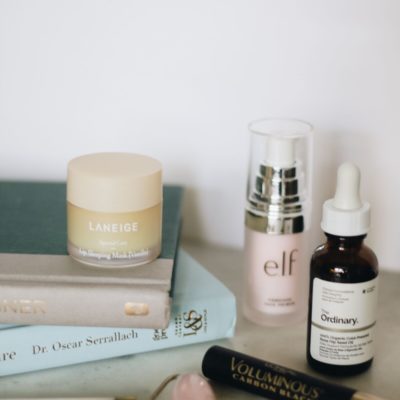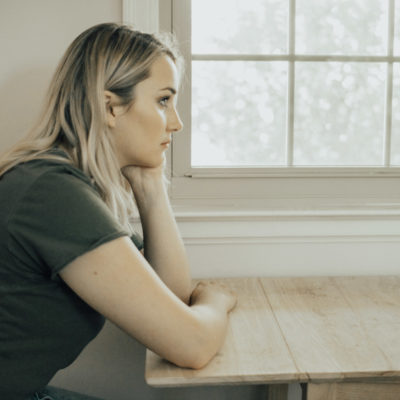Everything You Need to Know About Depression in Your 20s
posted on May 25, 2016 | by Amanda Holstein

There is such a stigma when it comes to “mental illnesses” like depression, but the reality is, it’s incredibly common, especially for women in their twenties. I’ve personally experienced it and know plenty of other people who have as well, so why are we so shy to talk about it? My guess is some of you out there may have dealt with depression, are dealing with it now, or may face it at some point in the future. And that’s totally okay. The point I want to get across is that you’re not alone, so don’t feel like you can’t ask about it, talk about it, or do something about it.
I got the chance to ask Psychotherapist Jennifer Silvershein a few common questions about depression that I thought some of you might have. So don’t be shy — take a look and hopefully these answers will help you or someone you know! The italicized paragraphs are some tidbits I added about my own experience, but the rest of the answers come directly from Jennifer Silvershein herself.
What’s the difference between feeling sad and feeling depressed?
Since we associate depression with the primary symptom of pervasive sadness, it’s common for people to struggle to tell the difference between sadness and depression. This confusion may cause individuals to neglect a serious condition thinking it may just be sadness and also may cause individuals to overreact to feelings of sadness thinking it may be depression.
Here’s a simple way to view the differences:
Sadness is a normal human emotion – this is something we have all experienced and will continue to experience throughout our lives. While these feelings of sadness can be triggered by a multitude of different events, we tend to feel sad about something. And once this something changes or the feeling lessons, the sadness dissipates.
Depression is an abnormal emotional state that influences our emotions, behaviors, perceptions and thinking in a widespread and prolonged way. When we feel depression there is no specific something, rather it’s everything. Depression is like a lingering cloud – hanging over all aspects of the individual’s life, making everything less pleasurable.
How can I tell if I’m depressed?
Below are a few signs and symptoms that twenty-somethings may experience:
A lack of enjoyment is a common symptom of depression. You might still go out with friends but may not enjoy yourself or feel as though you’re having fun. Commonly people describe going through the motions of their lives but not feeling as though they are truly able to be present in the moment.
Depression can consume our thoughts. A person may notice that their mind is filled with negative thoughts or a generally pessimistic outlook on life which can lead to a lack of focus in school or work and an inability to produce the amazing work that is typical for the individual without depression.
Other common symptoms include: low energy, reduced concentration, weight changes, less interest in sex, feeling hopeles, sleeplessness, early morning awakening, or oversleeping and not wanting to get up, as well as thoughts of self harm.
[Personally, I knew I was depressed when I didn’t want to get out of bed and felt a complete lack of motivation for anything. Things that typically got me excited didn’t have any effect on me anymore. I just wanted to be alone and I definitely cried a lot. The smallest things could make me cry to the point where I could tell it was the chemicals in my brain that were creating this, not something that had happened in real life.]
Why do twenty-somethings experience depression? What causes it?
Twenty-somethings are going through many psychosocial and biological experiences that make them especially vulnerable to depression. Depression is commonly triggered by loss and our twenties can be filled with potential loss: losing a job, not getting into the college or program we hoped for, breaking up with a significant other, realizing our dream career may not work out immediately, and shifting (and potentially losing) friends. Your twenties are an abstract time that can commonly leave people feeling powerless to the changes going on in life.
Starting college as well as graduating from college are both extremely stressful – they are both extremely overwhelming changes. We go from being taken care of and relying on adults to becoming our own advocates and caretakers. We also put a lot of pressure on ourselves! Many times students and post-grads find themselves trying to fulfill the expectations set by society to get good grades in school, become well rounded by participating in extracurricular, or land their dream job. While having high aspirations is not a bad thing, it’s important to be realistic so that we don’t create our own disappointments.
What are some things I can do immediately when I’m feeling depressed?
There are multitudes of ways in which an individual can alleviate feelings of depression. While the below list does not cover every way, it highlights many effective strategies for twenty-somethings.
- Psychotherapy is an effective way to treat depression and relieve symptoms experienced by individuals who suffer from depression. Working with a therapist assists individuals identify the factors that contribute to their depression and effectively cope with the psychological, behavioral, interpersonal and situational contributors.
- Reach out to your social network for support. It’s common to withdraw from our social supports, friends and family, when we’re feeling depressed but having, and using these supports is crucial while experiencing depression.
- Another way to begin combatting symptoms of depression is by leading a healthier lifestyle. This includes eating right, exercising and aiming to get at least 8 hours of sleep.
I always say, gratitude is the attitude, sometimes in those moments when we are so focused on our depressive feelings helping others enables us to feel more purposeful and therefore more positive!
What if I don’t have the funds to pay for a therapist or psychiatrist?
In 2008 The Mental Health Parity Law was passed requiring coverage of services for mental health, behavioral health and substance-use disorders to be comparable to physical health coverage. Seeing a therapist or psychiatrist does not need to break the bank! Most, if not all, colleges and universities have counseling centers that are of little, or no, cost to the students. A low cost way to obtain mental health services is to find an ‘in-network’ provider through your insurance company.
What can I expect when I see a therapist? How does it actually help?
I’m glad you asked! Many people feel nervous about contacting a therapist and this is perfectly normal, but making the call is taking the first step in empowering ourselves.
Seeing a therapist assists people to live happier, healthier and more productive lives. Going to therapy is a collaborative process based on the relationship between the client and the therapist. The relationship is rooted in dialogue, and provides a supportive and nonjudgmental environment that allows you to speak openly with an objective, neutral trained professional. Together, the client and their therapist will work to identify and explore the thoughts or behavioral patterns that restrict the client from feeling their best.
[Personally, I’ve seen a therapist on and off for years and my advice is to stick with it. I didn’t think it was helping during the first few months and after about 6 months, we hit a “breakthrough” and things began to snowball from there. It has seriously changed me for the better and made me such a stronger, more self-aware person! I highly recommend it!]
About Jennifer Silvershein:
Jennifer L. Silvershein, LMSW has her undergraduate degree from Union College and her Masters in Clinical Social Work from Columbia University. Jennifer has worked at St. Barnabas Hospital, The Renfrew Center NY, as well as Crisis Text Line. She is currently seeing individuals for psychotherapy within a private practice in Flatiron. For more information, or to work individually with Jennifer, she can be reached at jennifersilvershein@gmail.com.
What other questions do you have about depression?
Is there anything else you’d like to ask Jennifer Silvershein to answer in another post?
 Using Trunk Club to Update My Spring/Summer Wardrobe
Using Trunk Club to Update My Spring/Summer Wardrobe 5 Tips For Styling a Simple Summer Dress
5 Tips For Styling a Simple Summer Dress 5 Ways to Style a Bandana
5 Ways to Style a Bandana 3 Different Ways to Curl Your Hair
3 Different Ways to Curl Your Hair How to Master the 5-Minute Makeup Routine
How to Master the 5-Minute Makeup Routine Amazon Beauty Buys Under $25
Amazon Beauty Buys Under $25 3 Ways to Make Your next Trip More Memorable
3 Ways to Make Your next Trip More Memorable Tips for Digital Spring Cleaning and Organizing
Tips for Digital Spring Cleaning and Organizing Color Trend: Marigold
Color Trend: Marigold Mental Health Update: The 3 Major Changes I Made to Get Out of Depression
Mental Health Update: The 3 Major Changes I Made to Get Out of Depression 5 Unexpected Ways to Unwind After Work
5 Unexpected Ways to Unwind After Work How to Know You’re in a Controlling Relationship
How to Know You’re in a Controlling Relationship 4 Questions I get Asked as a Professional Resume Writer
4 Questions I get Asked as a Professional Resume Writer How to Make Friends at Work
How to Make Friends at Work Getting Out of the ‘Busy’ Mindset
Getting Out of the ‘Busy’ Mindset Ask Amanda: How do I pursue the career I want without formal training?
Ask Amanda: How do I pursue the career I want without formal training? Ask Amanda: How Do I Find a Therapist?
Ask Amanda: How Do I Find a Therapist? Ask Amanda: How do I stop being jealous in my relationship?
Ask Amanda: How do I stop being jealous in my relationship?



Megan Says
Thank you so much for posting this and helping to remove the stigma around mental illness, especially during this difficult time of our 20’s!
Amanda Says
Post authorThank you, Megan! I think it’s so important that we remove that stigma and am glad to hear you’re in agreement!
Chloe Says
Thank you so much for taking the time to recognize and talk about depression. I went through a period of depression my junior year of college and found myself spending all my time alone and crying for no apparent reason. It took me some time to discover the root cause, but once I did, it became easier to make changes in my life to improve my mental health.
Amanda Says
Post authorIt’s nice to know you can relate and I’m so happy to hear that you were able to discover the root cause of your depression and work through it. It’s not easy and you should be really proud of yourself!!
Rogan Says
I really appreciate you taking the time to post this interview and share your experience! So often with beautiful blogs displaying beautiful lives, we forget that life isn’t always perfect. It’s really refreshing that you address mental health issues so honestly.
Sada Says
Really informative article, thanks a tonne!
Thomas Andersen Says
Thank you for putting it out there. There’s so much painful stigma associated with depression. We who have experienced it can help to challenge it. I have written on it a bit here: https://medium.com/@thomasklem/the-stigma-of-depression-75f12c8e5051#.l3vmeve0h
Pingback: 6 things lately// | Reeve Currie
Michaela Says
I’ve been struggling with depression since my early teens – it runs in the family. I didn’t get a formal diagnosis until I was 24, but by that point I had two suicide attempts already under my belt. That’s why it’s SO IMPORTANT to break the stigma surrounding this stuff – talk to your friends, talk to your family, be supportive in any way they need you to be (without sacrificing your own mental health, of course!).
Medication and therapy are great for a lot of people, but if you’re like me and can’t afford health insurance (much less see a doctor or therapist) there are TONS of great apps out there for tracking and managing mental illness. Give some of them a try. And reach out to your friends, they’re supposed to be your support network so take advantage of that if you can.
Emily Says
I would like to know, as a parent of a depressed male 20 something, how do you get them to go to therapy? My son is depressed and needs help but will not seek help. I’m literally at my breaking point trying to help him. I’m a college graduate who has a minor in psychology but I’m definitely not a professional. Thanks. I feel so helpless.
Franca Whyte Says
I read through this post and I was impressed with the piece you shared here. Thanks for sharing it with, oh and yes I am really bookmarking this post. I need to find out more later and also share it with friends. Also, I wrote a review on AOL Mail Icon and would really appreciate it if you can take your time to check it out and give your feedback. Thanks.
prince Says
I have been on the internet lately, looking for something to read and that is how I came across your site and saw this article of yours. So, I decided to see what it says and I find out that it is so amazing. You really did a great work in on your site and the articles you posted on it. You really take your time in posting this article or and they are clearly detailed. Once again, you are good at article writing and I will be coming back to view more article updates on your site.
Shirley Says
Wow, I’ve been online lately and I haven’t seen this type of great content, Thanks so much and it help a lot. Meanwhile, I will always give a check on the website like twice a week to get more great and helpful content like this. https://mediavibestv.com/mp3paw-paw-mp3-download-free-mp3-music-in-high-quality/
Bright Says
Your post has been very helpful and thanks a lot for sharing.